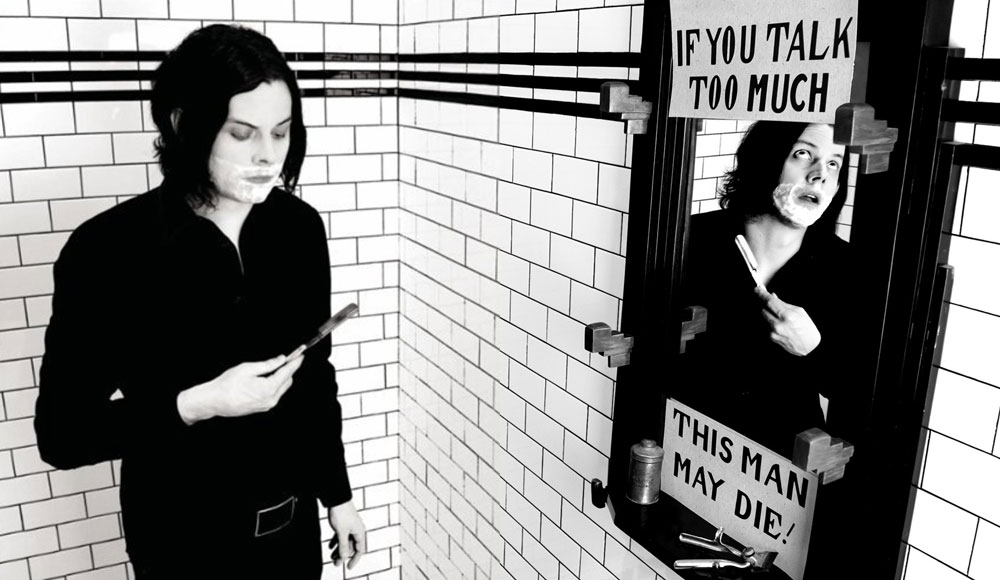
Jack White: Blunderbuss (Third Man / Columbia)
“Sixteen Saltines”
[audio:https://alarm-magazine.com/wp-content/uploads/2012/04/Jack_White_Sixteen_Saltines.mp3|titles=Jack White: “Sixteen Saltines”]For the past decade, Jack White always has felt like some sort of enigmatic miracle worker. Or perhaps “warlock” or “witch doctor” are more appropriate terms. But any way you slice it, the result has been the same: White has been able to (A) build something large out of very little and (B) bring focus and resolve to a kaleidoscope of different influences and styles when collaborating with peers. Whether serving as front-man and conductor of The White Stripes, co-partner and mastermind of The Raconteurs, puppet master of The Dead Weather, producer and visionary for Loretta Lynn, or collaborator with the Insane Clown Posse — just to name a few of his many, eclectic projects — White has hidden behind a mask when it comes to putting his touch on something. More than most of his contemporaries, he has been able to drape himself in mystique.
Until now. With the unraveling of The White Stripes and the hiatuses of his other projects, White has completed his latest and most authentic project to date: his first-ever solo album, Blunderbuss.
The question, initially, is how a Jack While solo album would sound, as the dexterous songwriter has worn many hats over the years. But rather than favoring some styles over others, White uses Blunderbuss to capture all of those musical tropes and motifs — from the old-school rock guitars of “Sixteen Saltines” to the subdued, Rhodes- and acoustic-oriented “Love Interruption.” And with a few piano wranglers (“Trash Tongue Talker”) and a blues-rock cover of a ’50s classic (Little Willie John’s “I’m Shakin’”) thrown in, Blunderbuss feels very much like a review of White’s songwriting strengths — without feeling derivative or scattered.
White also utilizes instruments that get back to the roots of rock, country, and folk music. Always an advocate of “less is more,” White tinkers with a pedal steel on the title track; “Hip (Eponymous) Poor Boy” features a saloon-style piano and mandolin strumming; and the acoustic seems to be broken out more times than on any other Jack White-related project. And whereas White’s bluesy, post-grunge distortion still permeates much of the album, he has supplemented it with the countrified twang of Nashville, his new hometown. He is relaxed on the record, and because of this, he lets more of his musical idiosyncrasies and explorations surface.
At its core, Blunderbuss feels like the lifting of a veil. It feels like it’s the first time where White, recently divorced, lets down his guard, dropping the masquerade and giving way to more intimate lyrics. Perhaps it’s because his own name is on the sleeve, but Blunderbuss feels real. There is a genuineness here that White only has intimated on past records. That’s not to say that past efforts haven’t explored real, raw emotion or anything, but let’s not forget that Jack White became famous for dressing like a cartoon and claiming that his ex-wife drummer was his sister. He’s been evasive in interviews and has upheld a certain façade when it comes to who Jack White really is. (Hell, Jack White isn’t even his real name.) But it seems that White has taken a step in a different direction with this album. The songs feel more immediate, more intimate, and more heartfelt than any others from the prolific songwriter.
On a song called “On and On and On,” White laments, “The people around me won’t let me become what I need to / They want me the same / I look at myself and I want to just cover my eyes / And give myself a new name.” And maybe that’s exactly what White has done here. By performing as Jack White and not as yet another project, there is no charade or gimmick to hide behind. He still has an air of mystery about him (just look at the album cover), but when it comes to the music and lyrics, White lets it all hang out on Blunderbuss — and he is all the better for it.


Great Article – Take a read.
Great read.
Great read.
great article, Michael Danaher.
thank you, sir.
nicely written Michael Danaher.
thanks, dude.
Nice job! Can’t wait to listen!